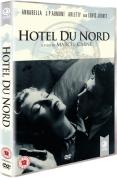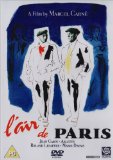![Le Jour Se Leve - 75th Anniversary Edition [DVD] [1939]](/pictures/1127849.jpg) Le Jour Se Leve - 75th Anniversary Edition | DVD | (27/10/2014)
from £11.89
| Saving you £6.10 (51.30%)
| RRP
Le Jour Se Leve - 75th Anniversary Edition | DVD | (27/10/2014)
from £11.89
| Saving you £6.10 (51.30%)
| RRP Marcel Carné directs this classic French romantic drama starring Jean Gabin. François (Gabin), a factory worker, has love affairs with a flower girl, Françoise (Jacqueline Laurent), and a performer, Clara (Arletty), both of whom have been involved with seedy, older man Valentin (Jules Berry). When the two men come face-to-face a jealous François ends up killing Valentin. As the police close in on him, François barricades himself in a small room, going over the events which led him into such desperate straits.
![Les Enfants Du Paradis (2 discs, limited edition packaging) [DVD]](/pictures/1117086.jpg) Les Enfants Du Paradis (2 discs, limited edition packaging) | DVD | (17/09/2012)
from £N/A
| Saving you £N/A (N/A%)
| RRP
Les Enfants Du Paradis (2 discs, limited edition packaging) | DVD | (17/09/2012)
from £N/A
| Saving you £N/A (N/A%)
| RRP Voted 'The Best French Film ever made' by the French Film Academy. Les Enfants du Paradis is a film of such dazzling proportions it has been labelled the French Gone With The Wind.Set amidst the glittering theatre world of 19th century Paris, the story revoles around the beautiful and free-spirted courtesan, Garanace, and the four men who compete for her affections; a mime-artist, an actor, an aristocrat and a criminal. As the melodrama unfolds, we are treated to one of cinema's greatest love stories, a captivating tale of passion, deception and murder.
![Quai Des Brumes (StudioCanal Collection) [DVD]](/pictures/1115106.jpg) Quai Des Brumes (StudioCanal Collection) | DVD | (10/09/2012)
from £N/A
| Saving you £N/A (N/A%)
| RRP
Quai Des Brumes (StudioCanal Collection) | DVD | (10/09/2012)
from £N/A
| Saving you £N/A (N/A%)
| RRP A military deserter finds love and trouble (and a small dog) in a smoky French port city.
![Hotel Du Nord [Blu-ray]](/pictures/1150743.jpg) Hotel Du Nord | Blu Ray | (10/02/2020)
from £23.98
| Saving you £N/A (N/A%)
| RRP
Hotel Du Nord | Blu Ray | (10/02/2020)
from £23.98
| Saving you £N/A (N/A%)
| RRP Classic French drama from director Marcel Carné. At the family-run Hotel Du Nord, a young couple check in, planning to commit a double-suicide. Pierre (Jean-Pierre Aumont) shoots his lover Renée (Annabella), but then panics and flees, leaving the gun behind. Renée survives her wound after being found by pimp Edmond (Louis Jouvet). After taking a job at the hotel as a chambermaid, Renée slowly becomes involved in the shifting allegiances and relationships between the people who live and work in the hotel.
![Les Enfants Du Paradis [1945]](/pictures/1041646.jpg) Les Enfants Du Paradis | DVD | (25/09/2000)
from £16.96
| Saving you £3.03 (17.87%)
| RRP
Les Enfants Du Paradis | DVD | (25/09/2000)
from £16.96
| Saving you £3.03 (17.87%)
| RRP A film which regularly charts high in critics' polls of the best films of all time, director Marcel Carné and screenwriter Jacques Prévert's masterpiece Les Enfants du Paradis is as solid a landmark in French film history as the Eiffel Tower is on the Parisian landscape. And at 187 minutes running time, it's a massy edifice indeed, built from a rambunctious cast of characters--ranging from pickpockets and prostitutes to aristocrats and actors--whose lives intersect around the Theatre des Funambules, a popular Parisian theatre on the Boulevard du Crime, during the 1840s. (The title refers to the poor who can only afford seats in the upper galleries of the theatre.) The heart of the plot is a love story between mime artiste Baptiste (Jean-Louis Barrault) and streetwalker Garance (the magnificent, sand-paper-voiced Arletty). When Garance is falsely accused of pickpocketing, Baptiste provides a mimed alibi for her to the police (one of the film's most famous set pieces). The rose she later throws him in gratitude sets off a romantic obsession, one of several that structure the film, as do love triangles, duels, and tortured confessions of feeling. Thematically, Les Enfant du Paradis gnaws over typically French cinematic preoccupations: illusion and reality, the nature of performance, the indomitable spirit of the proletariat and so on, all made the more charged and poignant when you know the film was shot during the Nazi occupation. (One actor, Robert Le Vigan, was reportedly a Nazi collaborator and disappeared during the filming under mysterious circumstances and so had to be replaced by Pierre Renoir.) --Leslie Felperin
![Les Enfants Du Paradis - The Restored Edition (Limited Edition Packaging) [Blu-ray]](/pictures/1117087.jpg) Les Enfants Du Paradis - The Restored Edition (Limited Edition Packaging) | Blu Ray | (17/09/2012)
from £N/A
| Saving you £N/A (N/A%)
| RRP
Les Enfants Du Paradis - The Restored Edition (Limited Edition Packaging) | Blu Ray | (17/09/2012)
from £N/A
| Saving you £N/A (N/A%)
| RRP Voted 'The Best French Film ever made' by the French Film Academy. Les Enfants du Paradis is a film of such dazzling proportions it has been labelled the French Gone With The Wind.Set amidst the glittering theatre world of 19th century Paris, the story revoles around the beautiful and free-spirted courtesan, Garanace, and the four men who compete for her affections; a mime-artist, an actor, an aristocrat and a criminal. As the melodrama unfolds, we are treated to one of cinema's greatest love stories, a captivating tale of passion, deception and murder.
![Le Jour Se Leve - 75th Anniversary Edition [Blu-ray] [1939] [Region Free]](/pictures/1127850.jpg) Le Jour Se Leve - 75th Anniversary Edition | Blu Ray | (27/10/2014)
from £15.98
| Saving you £9.00 (64.33%)
| RRP
Le Jour Se Leve - 75th Anniversary Edition | Blu Ray | (27/10/2014)
from £15.98
| Saving you £9.00 (64.33%)
| RRP Marcel Carné directs this classic French romantic drama starring Jean Gabin. François (Gabin), a factory worker, has love affairs with a flower girl, Françoise (Jacqueline Laurent), and a performer, Clara (Arletty), both of whom have been involved with seedy, older man Valentin (Jules Berry). When the two men come face-to-face a jealous François ends up killing Valentin. As the police close in on him, François barricades himself in a small room, going over the events which led him into such desperate straits.
 Quai Des Brumes (DVD) (Digitally Restored) | DVD | (04/06/2012)
from £9.88
| Saving you £6.11 (61.84%)
| RRP
Quai Des Brumes (DVD) (Digitally Restored) | DVD | (04/06/2012)
from £9.88
| Saving you £6.11 (61.84%)
| RRP Based on the novel by Pierre Mac Orlan, the inimitable team of director Marcel Carne and writer Jacques Prevert deliver a quintessential example of poetic realism, one of the classics of the golden age of French cinema.Down a foggy, desolate road to the port city of Le Havre travels Jean (Jean Gabin), an army deserter looking for another chance to make good on life. Fate, however, has a different plan for him, when acts of both revenge and kindness turn him into front-page news.Also starring the blue-eyed phenomenon Michele Morgan in her first major role, and the menacing Michel Simon, Port Of Shadows (Le Quai des brumes) starkly portrays an underworld of lonely souls wrestling with their own destinies.
![Le Jour Se Leve [1939]](/pictures/1070262.jpg) Le Jour Se Leve | DVD | (30/04/2007)
from £17.53
| Saving you £0.46 (2.62%)
| RRP
Le Jour Se Leve | DVD | (30/04/2007)
from £17.53
| Saving you £0.46 (2.62%)
| RRP Francois (Jean Gabin) sits locked in his room a gun in his hand having just committed the murder. As he contemplates his fate he reflects as to how events conspired to bring his life to this conclusion - starting with falling in love with a young florist whose attentions are soon distracted by the arrival of a Machiavellian dog trainer Valentin...
 Hotel Du Nord | DVD | (24/04/2006)
from £29.99
| Saving you £-10.00 (N/A%)
| RRP
Hotel Du Nord | DVD | (24/04/2006)
from £29.99
| Saving you £-10.00 (N/A%)
| RRP ""Atmosphre? Atmosphre? Est-ce que j'ai une gueule d'atmosphre?"" Hotel du Nord is the second part of Marcel Carne's ""fatalistic romantic melodramas"" following Quai des Brumes and later completed by Le Jour se Leve. Renee (Annabella) and Pierre (Jean-Pierre Aumont) take a room at the shabby Parisian Hotel du Nord with the intention of seeing through a suicide pact. However Pierre shoots Annabella but cannot turn the gun on himself. Seedy pimp Monsieur
![Therese Raquin [1953]](/pictures/1091173.jpg) Therese Raquin | DVD | (16/03/2009)
from £N/A
| Saving you £N/A (N/A%)
| RRP
Therese Raquin | DVD | (16/03/2009)
from £N/A
| Saving you £N/A (N/A%)
| RRP Married at a very early age to her cousin Th''r''se Raquin (Simone Signoret Room at the Top Casque D''Or) leads an uneventful and joyless existence void of romance with her selfish husband (Jacques Duby) and authoritarian aunt. The arrival of the handsome Italian Laurent (Raf Vallone The Italian Job The Godfather: Part III) to whom Camille has taken a liking turns her life upside down. Straight away sparks of love and passion fly between Th''r''se and Laurent however Camille refuses to agree to a divorce and plans to take Th''r''se to Paris away from temptation. En route Camille is pushed off the train after a violent dispute with Laurent. The inquiry draws the conclusion of accidental death. However a young sailor who witnessed the entire scene starts blackmailing Laurent'' Th''r''se Raquin is an adaptation of Emile Zola''s novel by critically acclaimed director Marcel Carn'' (Le Jour se L''ve Le Quai des Brumes). The film won a Silver Lion at the 1953 Venice Film Festival.
 L'Aur De Paris | DVD | (16/03/2009)
from £20.23
| Saving you £-2.24 (N/A%)
| RRP
L'Aur De Paris | DVD | (16/03/2009)
from £20.23
| Saving you £-2.24 (N/A%)
| RRP L' Air De Paris
![Quai Des Brumes [1938]](/pictures/1068719.jpg) Quai Des Brumes | DVD | (30/04/2007)
from £13.50
| Saving you £4.49 (25.00%)
| RRP
Quai Des Brumes | DVD | (30/04/2007)
from £13.50
| Saving you £4.49 (25.00%)
| RRP Based on the novel by Pierre Mac Orlan the inimitable team of director Marcel Carne and writer Jacques Prevert deliver a quintessential example of poetic realism one of the classics of the golden age of French cinema. Down a foggy desolate road to the port city of Le Havre travels Jean (Jean Gabin) an army deserter looking for another chance to make good on life. Fate however has a different plan for him when acts of both revenge and kindness turn him into front-page news. Also starring the blue-eyed phenomenon Michele Morgan in her first major role and the menacing Michel Simon Port Of Shadows (Le Quai des brumes) starkly portrays an underworld of lonely souls wrestling with their own destinies.
![Drole De Drame [DVD]](/pictures/1111285.jpg) Drole De Drame | DVD | (16/01/2012)
from £4.75
| Saving you £15.24 (320.84%)
| RRP
Drole De Drame | DVD | (16/01/2012)
from £4.75
| Saving you £15.24 (320.84%)
| RRP Dr. Molyneux, the elderly botanist who loves nothing more than his mimosa plants, also secretly authors crime novels under the pen name Felix Chapel -- but only because his wife insists they need the money. As it turns out, Molyneux gets the stories from his adopted daughter Eva, who in turn gets them from the milkman, who's madly in love with her. Everything would be fine if it wasn't for Chapel's relative, the Bishop of Bedford, who is crusading against Chapel's dangerous novels. The Bishop is not quite wrong because a man known as the Butcher Killer blames Chapel for his own crimes. When the bishop invites himself for dinner at Molyneux's house, hilarity ensues.

Please wait. Loading...
This site uses cookies.
More details in our privacy policy